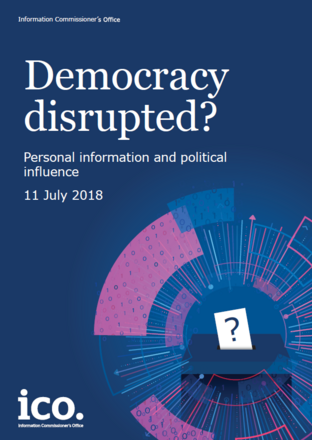
Related contents
CPDP 2019: Democracy distrupted?Disinformation and ‘fake news’: Interim Report
Disinformation and ‘fake news’: Final Report
Different data processing techniques are used by businesses and political parties to micro-target individuals, and because these tools can have a significant impact on people’s privacy, it is important to ensure a high level of transparency. Otherwise, there is the risk of developing a system of voter surveillance by default that inevitably would affect democracy and political life.
Engagement with voters is essential to the democratic process, and political parties have always tried different communication methods and marketing techniques to promote their political messages.
The advent of social media, the growth in big data, and the exponential increase in volume and scale of personal information have changed the scenario. Political parties have started using increasingly sophisticated techniques to run data-driven campaigns, that are really effective but less transparent in their functioning. In fact, through digital campaigning it is now possible to target and profile voters with highly personalised adverts based on their personal information.
Data protection law does not prevent political parties from using social media in campaigns, but as these digital campaigning tools have a significant impact on individuals’ privacy, it is important to ensure that political parties act in compliance with data protection law.
At the European level, the GDPR recognises strong data protection rights for individuals and control over how their data is used. However, the report states that one of the most concerning findings from the investigation was a significant shortfall in transparency and provision of fair processing information, in particular in relation to the use of personal data from the Electoral Register, micro-targeting on social media, and the use of a software to screen people’s names for likely ethnicity and age.
The principle of electoral transparency should be enforced offline as well as online. Concerning Facebook, its advertising model provides several tools that can be used also by political parties for running their campaigns. However, even though several measures to ensure data protection principles are in place, there are concerns about the general lack of transparency and clarity about how users might be targeted by a political party or campaign.
The use of data analytics and new technologies are changing the democratic process and profound information asymmetries are emerging between different groups of voters. The report suggests that an ethical debate should start among all the key players involved (political parties, online platforms, governments and policy makers, civil society), to redefine the boundaries and responsibilities in respect of the use of personal data and to reinforce trust in the integrity of the democratic process.
The report concludes with a set of ten policy recommendations in respect of the transparent and lawful use of data analytics in political campaigns in the future.
Tags: Media funding Propaganda Big data Privacy United Kingdom TransparencyThe content of this article can be used according to the terms of Creative Commons: Attribution-NonCommercial 4.0 International (CC BY-NC 4.0) . To do so use the the wording "this article was originally published on the Resource Centre on Media Freedom in Europe" including a direct active link to the original article page.

